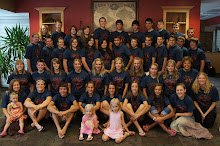How 'Hot' Is Your Tween On Facebook?
Joan Indiana Rigdon, 04.15.10, 05:00 PM EDTRacy profiles. Sexting. Cyberbullying. Isn't it time for schools, parents and social-media sites to get extremely specific about Internet safety?
PTAs across the land are holding meetings about Internet safety. School counselors are coaching classrooms on safe social networking, sexting and cyberbullying. Plenty of parents are echoing everything back at home.
MySpace regularly reports how many sex offenders it has kicked off its site (90,000, it claims, as of February 2009). In a 2008 deal with the nation's attorneys general, Facebook agreed to identify and delete "profiles of all registered sex offenders." And several states are passing or mulling over laws that would ban convicted offenders from social-networking sites.
This week, Facebook and its global Safety Advisory Board relaunched Facebook's Safety Center. The new page features a cleaner look plus loads of information specifically targeted at parents, teens, educators and law enforcement. There are plenty of tips for coping with cyberbullying and other problems, like impersonators and unwanted invitations to chat.
We all love information. But let's face it. Brochures and instructionals, whether printed or online, only go so far. They certainly don't ensure meaningful protection for wanna-be adults who are eager to launch or finesse their online personas.
I know this because many of my friends and relatives have kids who are aging into Facebook. It's enlightening--and occasionally disturbing--to see their profiles.
A few months back, one tween, who is Friend of a Friend, made a racy debut on FB. She didn't intend to be racy; she just turned out that way after answering the site's profile questionnaire.
Asked to provide her gender, she checked female. So far, so good. Next, under "Interested In" she was presented with two choices, men or women. She checked men.
Then came a list: Was she interested in friendship, relationships, networking or getting back in touch? As a middle schooler, "relationships" seemed like a good fit, so she checked that.
For good measure, she let her sense of enthusiasm and humor slip through, describing herself as "HOT!" for "boiiiis."
Voilà! By the time her FB profile went live, she was a "HOT!" tween, interested in relationships with men (and boiiiis). And her profile was public, for all the world to see.
Several of her new (adult) Friends collectively gasped. Her parents were alerted. They're quite savvy about real-world threats, but are still mastering the nuances of social networking profiles. (They hadn't seen hers.) Within hours, the profile reemerged--no longer public and with no references to hotness, men or relationships. She's just a regular kid now.
Facebook's new Safety Center might have helped, insofar as it provides links to its primer on privacy settings. But as far as I can tell, it doesn't have any specific information about how to build a safe profile for kids. That may seem like common sense, but for many tweens, teens and even parents, it just isn't.
Isn't it time for schools, parents and social-media sites to get extremely specific about Internet safety, the same way schools already are about sex education?
Even First Lady Michelle Obama worries about this. Just this week, she revealed that in the Obama household, "We talk a lot with [our daughters] about the dangers of Facebook and sort of getting into that social networking kind of gossip mill..."
Most of us, and most of our older kids, know the basics. We're aware that there's such a thing as unsafe online behavior that can lead to kids being spirited away by child molesters or, far more commonly, being lured into inappropriate video or anonymous chat rooms or objectionable sites. But other than not giving away full names, addresses and phone numbers, most kids and their parents don't seem to be aware of just how easy they are to find and what specific behaviors they should avoid.
Even worse, most kids aren't really concerned about privacy.
Back in the mid-1990s, I put together a roundtable discussion about how girls use the Internet. I recruited three middle school-aged girls and three experts. As we talked, one of the girls mentioned that she was mad at a boy she'd met only online and wasn't chatting with him anymore--but that before the fight, she had e-mailed that boy pictures of herself and her little brother. She was reasonably sure he was just a boy, because he was a friend of a real-world friend. But her family had no idea she was transmitting photos of herself or her brother to strangers online.
Maybe it's time for more schools to put together hands-on workshops for parents to give us all a crash course in various social networking sites and how to safely participate--with specific information about what a kid's profile should look like and which privacy settings make sense.
In the meantime, we parents will have to monitor, and even spy. But that's another story to be told after my 8-year-old daughter discovers Facebook. Or sooner, since she's already dabbling with e-mail.
Over to you, readers: What kinds of technology rules and guidelines do you have in your house?


No comments:
Post a Comment